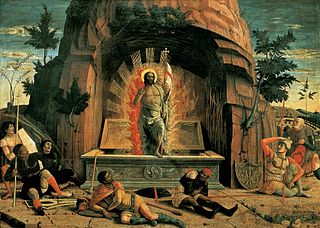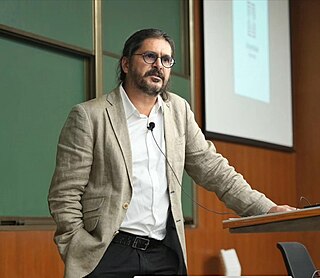
The afterlife or life after death is a purported existence in which the essential part of an individual's stream of consciousness or identity continues to exist after the death of their physical body. The surviving essential aspect varies between belief systems; it may be some partial element, or the entire soul or spirit, which carries with it one's personal identity.

David Hume was a Scottish philosopher, historian, economist, and essayist who was best known for his highly influential system of empiricism, philosophical scepticism and metaphysical naturalism. Beginning with A Treatise of Human Nature (1739–40), Hume strove to create a naturalistic science of man that examined the psychological basis of human nature. Hume followed John Locke in rejecting the existence of innate ideas, concluding that all human knowledge derives solely from experience. This places him with Francis Bacon, Thomas Hobbes, John Locke, and George Berkeley as an empiricist.
Philosophy of religion is "the philosophical examination of the central themes and concepts involved in religious traditions". Philosophical discussions on such topics date from ancient times, and appear in the earliest known texts concerning philosophy. The field involves many other branches of philosophy, including metaphysics, epistemology, logic, ethics, aesthetics, philosophy of language, and philosophy of science.

Resurrection or anastasis is the concept of coming back to life after death. Reincarnation is a similar process hypothesized by other religions involving the same person or deity returning to another body. The disappearance of a body is another similar but distinct belief in some religions.

The soul, regarded as the immaterial self which most ordinary people initially believe in, is often discussed in the context of religion, theology, psychology and philosophy. According to Stewart Goetz, anthropologists and psychologists have found that ordinary humans interculturally have distinguished between souls and bodies.

Nicolas Malebranche was a French Oratorian Catholic priest and rationalist philosopher. In his works, he sought to synthesise the thought of St. Augustine and Descartes, in order to demonstrate the active role of God in every aspect of the world. Malebranche is best known for his doctrines of vision in God, occasionalism and ontologism.

Immortality is the concept of eternal life. Some species possess "biological immortality" due to an apparent lack of the Hayflick limit.
A person is a being who has certain capacities or attributes such as reason, morality, consciousness or self-consciousness, and being a part of a culturally established form of social relations such as kinship, ownership of property, or legal responsibility. The defining features of personhood and, consequently, what makes a person count as a person, differ widely among cultures and contexts.

Christian mortalism is the Christian belief that the human soul is not naturally immortal and may include the belief that the soul is "sleeping" after death until the Resurrection of the Dead and the Last Judgment, a time known as the intermediate state. "Soul sleep" is often used as a pejorative term, so the more neutral term "mortalism" was also used in the nineteenth century, and "Christian mortalism" since the 1970s. Historically the term psychopannychism was also used, despite problems with the etymology and application. The term thnetopsychism has also been used; for example, Gordon Campbell (2008) identified John Milton as believing in the latter.
Phædo or Phaedo, also known to ancient readers as On The Soul, is one of the best-known dialogues of Plato's middle period, along with the Republic and the Symposium. The philosophical subject of the dialogue is the immortality of the soul. It is set in the last hours prior to the death of Socrates, and is Plato's fourth and last dialogue to detail the philosopher's final days, following Euthyphro, Apology, and Crito.

Peter John Kreeft is a professor of philosophy at Boston College and The King's College. A convert to Catholicism, he is the author of over eighty books on Christian philosophy, theology and apologetics. He also formulated, together with Ronald K. Tacelli, Twenty Arguments for the Existence of God in their Handbook of Christian Apologetics.

Platonism is the philosophy of Plato and philosophical systems closely derived from it, though contemporary Platonists do not necessarily accept all doctrines of Plato. Platonism has had a profound effect on Western thought. At the most fundamental level, Platonism affirms the existence of abstract objects, which are asserted to exist in a third realm distinct from both the sensible external world and from the internal world of consciousness, and is the opposite of nominalism. This can apply to properties, types, propositions, meanings, numbers, sets, truth values, and so on. Philosophers who affirm the existence of abstract objects are sometimes called Platonists; those who deny their existence are sometimes called nominalists. The terms "Platonism" and "nominalism" also have established senses in the history of philosophy. They denote positions that have little to do with the modern notion of an abstract object.

John Richard Perry is a professor at Stanford University and the University of California, Riverside. He has made significant contributions to philosophy in the fields of philosophy of language, metaphysics, and philosophy of mind. He is known primarily for his work on situation semantics, reflexivity, indexicality, personal identity, and self-knowledge.
Nancey Murphy is an American philosopher and theologian who is Professor of Christian Philosophy at Fuller Theological Seminary, Pasadena, CA. She received the B.A. from Creighton University in 1973, the Ph.D. from University of California, Berkeley in 1980, and the Th.D. from the Graduate Theological Union (theology) in 1987.
Maitreyi was an Indian philosopher who lived during the later Vedic period in ancient India, estimated to have lived during the 8th century BCE. She's mentioned in the Brihadaranyaka Upanishad as one of two wives of the Vedic sage Yajnavalkya. In the Hindu epic Mahabharata and the Gṛhyasūtras, however, Maitreyi is described as an Advaita philosopher who never married. In ancient Sanskrit literature, she is known as a brahmavadini.
The philosophy of self examines the idea of the self at a conceptual level. Many different ideas on what constitutes self have been proposed, including the self being an activity, the self being independent of the senses, the bundle theory of the self, the self as a narrative center of gravity, and the self as a linguistic or social construct rather than a physical entity. The self is also an important concept in Eastern philosophy, including Buddhist philosophy.
In the philosophical subdiscipline of ontology, animalism is a theory of personal identity that asserts that humans are animals. The concept of animalism is advocated by philosophers Eric T. Olson, Peter van Inwagen, Paul Snowdon, Stephan Blatti, David Hershenov and David Wiggins. The view stands in contrast to positions such as John Locke's psychological criterion for personal identity or various forms of mind–body dualism, such as Richard Swinburne's account.
Personal identity is the unique numerical identity of a person over time. Discussions regarding personal identity typically aim to determine the necessary and sufficient conditions under which a person at one time and a person at another time can be said to be the same person, persisting through time.
Kaave Lajevardi is an Iranian philosopher. He is known for translating classic philosophy books into Persian. Lajevardi was a faculty member of Institute for Research in Fundamental Sciences (2008-2012). He has published some papers on academic dishonesty in Iranian universities.

Jonardon Ganeri, FBA, is a philosopher, specialising in philosophy of mind and in South Asian and Buddhist philosophical traditions. He holds the Bimal Matilal Distinguished Professorship in Philosophy at the University of Toronto. He was Global Network Professor in the College of Arts and Science, New York University, previously having taught at several universities in Britain. Ganeri graduated from Churchill College, Cambridge, with his undergraduate degree in mathematics, before completing a DPhil in philosophy at University and Wolfson Colleges, Oxford. He has published eight monographs, and is the editor of the Oxford Handbook of Indian Philosophy. He is on the editorial board of the Stanford Encyclopedia of Philosophy, the British Journal for the History of Philosophy, Philosophy East & West, Analysis, and other journals and monograph series. His research interests are in consciousness, self, attention, the epistemology of inquiry, the idea of philosophy as a practice and its relationship with literature. He works on the history of ideas in early modern South Asia, intellectual affinities between India and Greece, and Buddhist philosophy of mind, teaches courses in the philosophy of mind, the nature of subjectivity, Buddhist philosophy, the history of Indian philosophical traditions, and supervises graduate students on South Asian philosophical texts in a cross-cultural context. He is a prominent advocate for an expanded role for cross-cultural methodologies in philosophical research, and for enhanced cultural diversity in the philosophical curriculum. Jonardon Ganeri is the inventor of the idea of "cosmopolitan philosophy" as a new discipline within philosophy.











